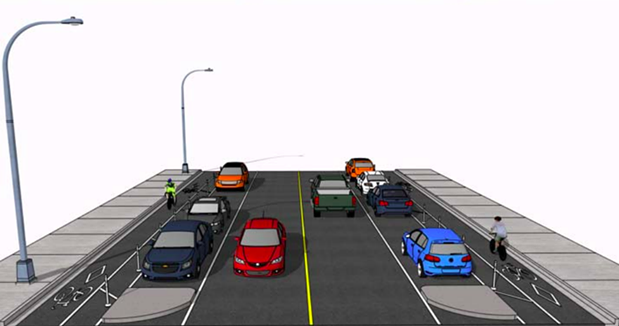
VIA HRM
Cyclists will soon be free to travel through the south end's white void without worrying about cars.
Cyclists and pedestrians are about to have easier access to some of the city’s busiest shopping districts.
Halifax Regional Council approved motions this week to install a protected bike lane on South Park Street and a dedicated bus lane on Gottingen Street, over the protests of small business owners worried about parking.
On Tuesday, council voted 11-2 for a new protected bike lane stretching through a kilometre of road along South Park from Sackville Street to Inglis Street. The lanes will provide a buffer from traffic for cyclists, but at the cost of 55 parking spots in a busy commercial district.
While much of the community is in support of new bike lanes, there were still strong concerns about what losing street parking might mean for small businesses.
The Spring Garden Area Business Association (
Transportation Advisory Committee.
“The success of Spring Garden Road depends on those who shop here, the retailers who operate
The business association threw its support behind an alternative option presented to council, which would have saved 17 parking spots by integrating the bike lanes with pre-existing offroad bike paths. Staff recommended against that plan “as it presents several challenges that would add significant cost and complexity to the project while offering relatively few benefits.”
As it stands, the protected South Park Street bike lanes will cost the city $435,000 to install, and potentially the loss of $30,000 a year in meter revenue. No cost analysis was available for the alternative.
Some councillors wanted more research into the alternative before rejecting it, but the majority felt the loss of parking is a small price to pay for a healthier and more vibrant downtown.
“I don’t want more people coming down and parking,” said Halifax West Armdale councillor Shawn Cleary, who brought along several “props” including his own bike helmet. “I want more people coming by bike, walking, by bus...Businesses want people, but people arrive in different ways.”
It’s a repeated lament in Halifax that fewer parking spaces on city streets
Research from Dalhousie’s University’s school of planning, studying parking on Agricola Street, previously found pedestrians and cyclists visit the businesses they’re passing more frequently and spend more money than drivers. Those findings echo other studies conducted in cities across Canada and the United States.
“I understand people’s reticence,” said Cleary. “With
Council had a similar, albeit shorter, debate when approving new bus lanes on Gottingen from North Street to Cogswell Street, and on Bayers Road from Romans Avenue to Windsor Street.
Like with the bike lanes, business owners on Gottingen have come forward in recent weeks expressing concern about the loss of revenue from removing streetside parking.
Council ultimately passed the motion, with provisions for temporary parking and unloading during non-peak transit times and a caveat for staff to report back with a parking loss mitigation plan and other details sometime in the future. Staff will also return with a supplementary report monitoring pedestrian activity and bike lane usage
According to Middle/Upper Sackville–Beaver Bank–Lucasville councillor Lisa Blackburn, both motions represent the next steps in the municipality’s celebrated Integrated Mobility Plan.
“The bottom line is we signed onto the Integrated Mobility Plan, and now it’s time to show our backbone because the single passenger vehicle is a dinosaur.”
